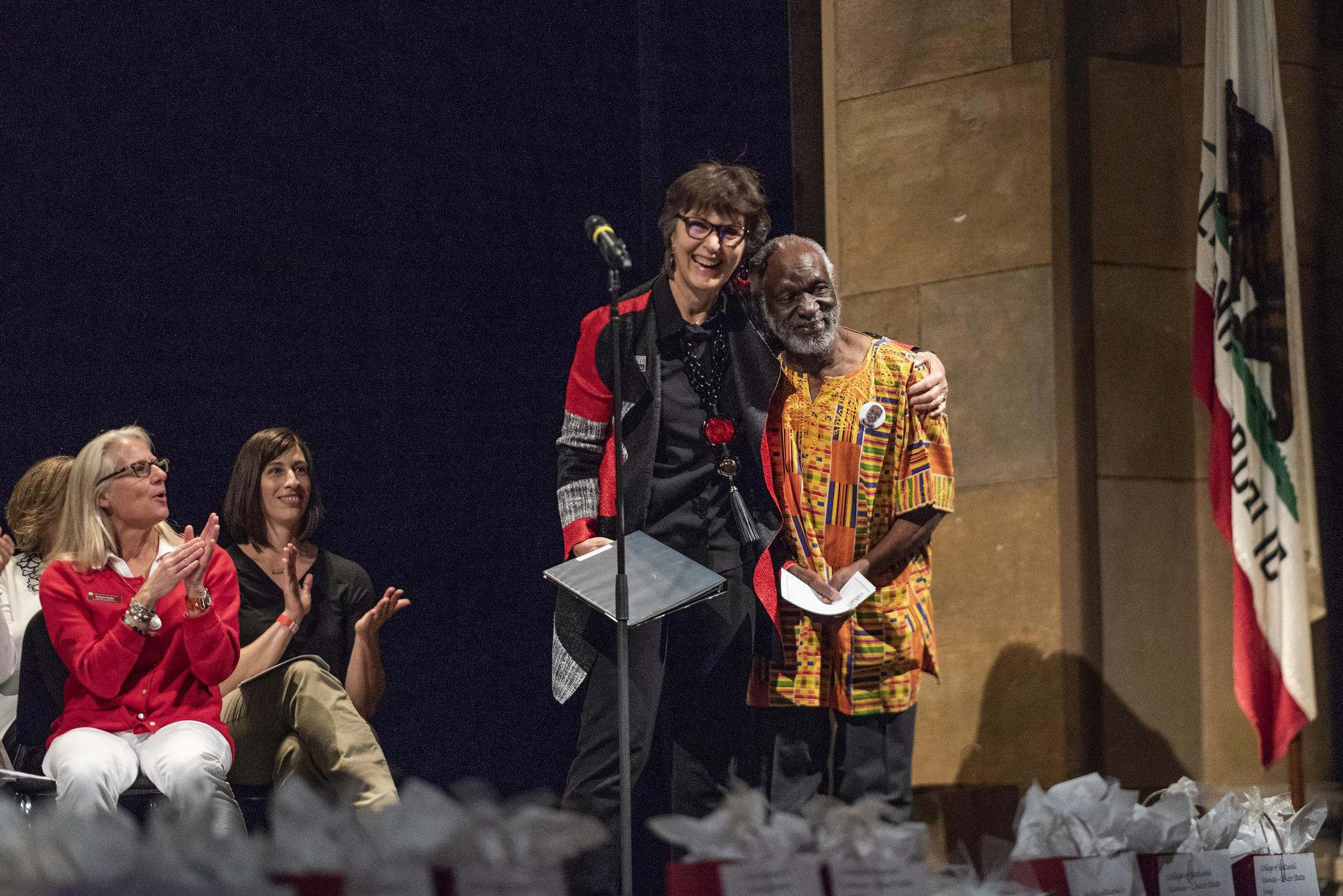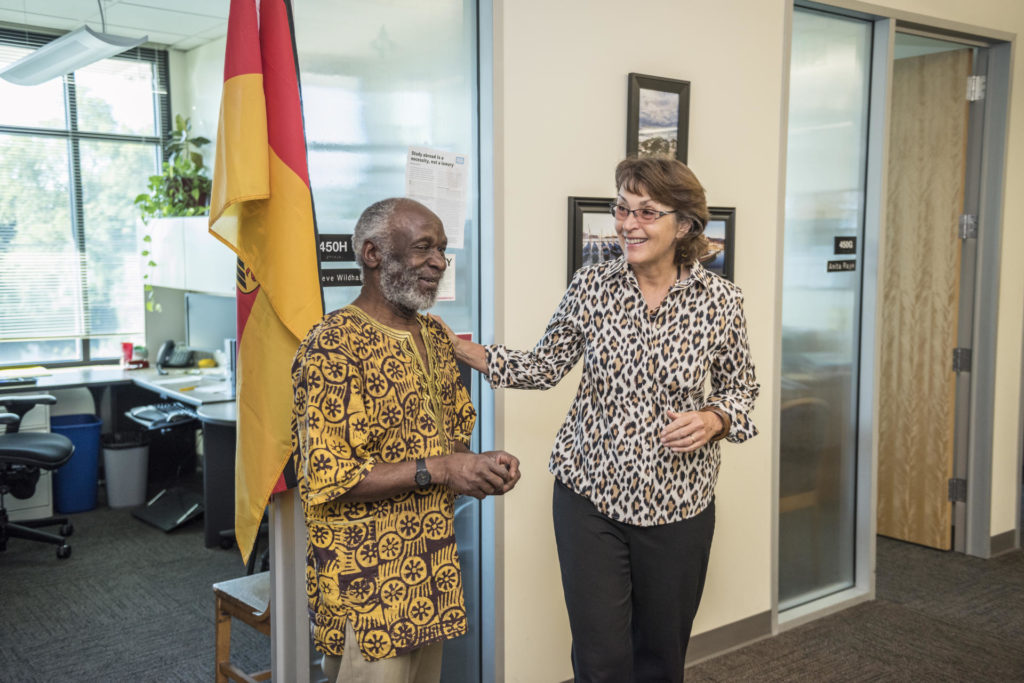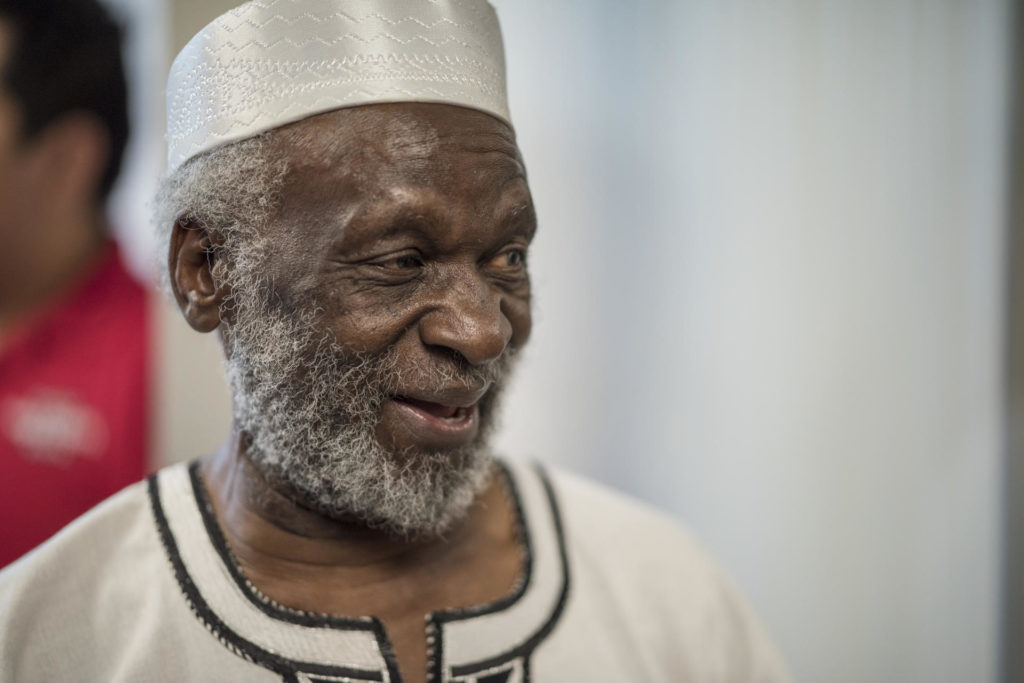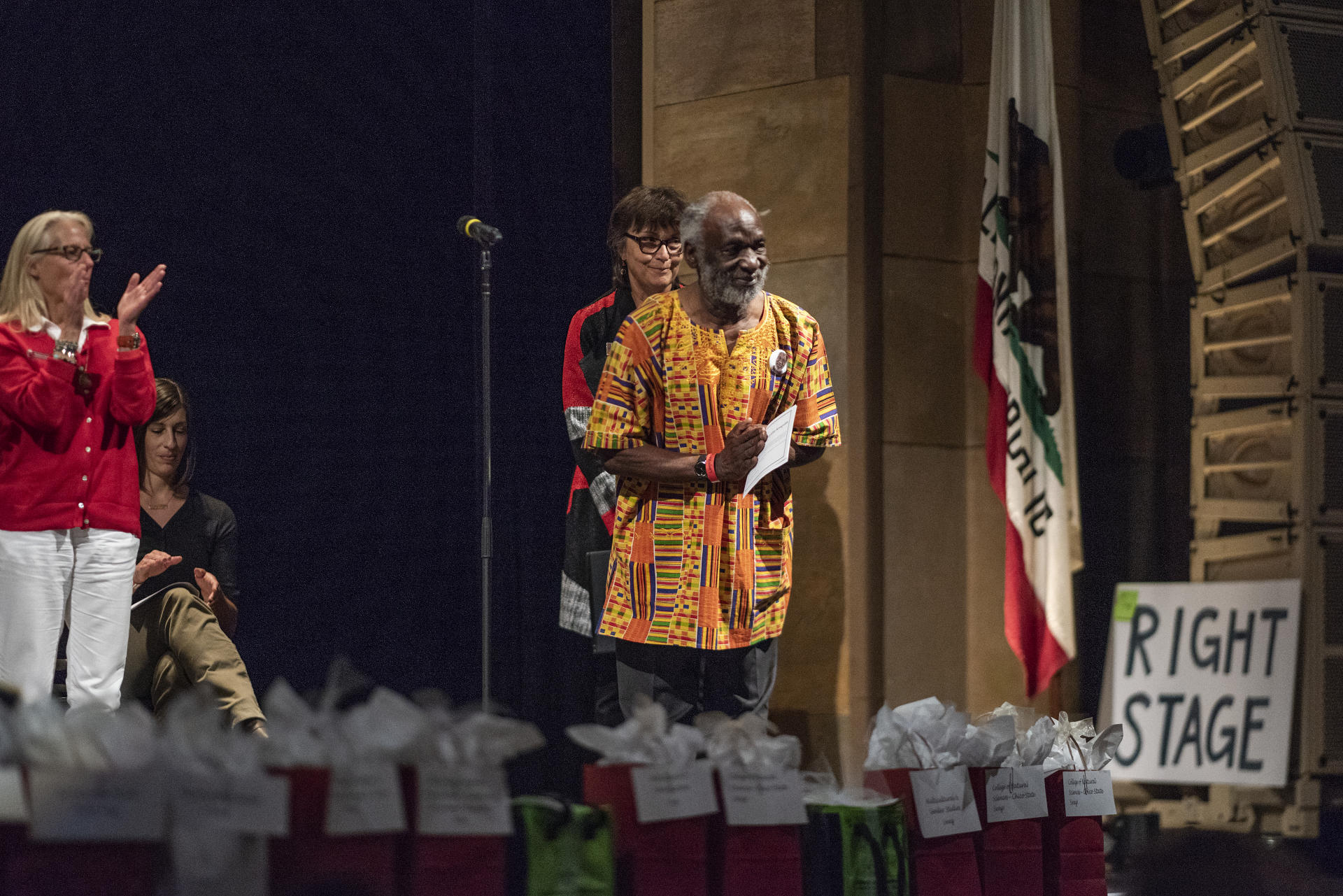For 45 Years, International Education Has Been His Life’s Work

President Gayle Hutchinson (left) recognizes James Luyirika-Sewagudde, Jr., (right) for 45 years of service as staff are honored during the Staff Awards Luncheon on Thursday, May 24, 2018 in Chico, Calif. (Jason Halley/University Photographer/CSU Chico)
A distinguished face gazes out from the southwest edge of campus, its dark beard mixed with gray, mouth set in a comforting smile, and eyes twinkling with patience, kindness, and understanding.
It’s one of 110 compelling portraits that welcome passers-by from a series of banners, the smiling faces of campus community members and the mantras “We Are One University” and “We Are Chico State.” The featured individuals are, in a way, visual ambassadors of the University, showcasing the diversity and inclusion that are intended to be hallmarks of the Chico Experience.
Perhaps no one lives up to that role better than James Luyirika-Sewagudde, Jr., a 45-year employee of Chico State, with every one of those years spent in the University’s Office of International Education (OIE).
As an advisor for international students, “Mr. James,” as they call him, is a calming campus presence who long ago committed to learning from and adapting to varied communication styles from around the world.

“When you take the time to talk to the students,” he said, “they have the confidence to tell you what it is that they want to do.”
This one-on-one assistance can include addressing roommate conflicts, financial concerns, issues with professors, racism, communication, and the recent travel ban. And when he helps his students navigate systems domestically, he’s gaining an international perspective.
“If we’re the center of the world like we like to say the United States is, it’s our obligation to know what surrounds us,” Luyirika-Sewagudde said. “I think it’s a better chance to promote international understanding.”
Luyirika-Sewagudde’s impact can be difficult to capture. He’s been advisor, ambassador, and counselor for thousands of University students from dozens of different countries for more than four decades. He’s worked under seven Chico State presidents and communes with offices in every corner of campus, from Enrollment Management and the Office of the Registrar to the Counseling and Wellness and Student Learning Centers. And he’s tasked with completing the OIE’s most important responsibilities: renewing certifications and maintaining authorizations and designations for hundreds of international student scholars every year so Chico State’s accreditation is up-to-date.
“He is a phenomenal advisor. He really connects with the students, and the students love him,” said professor Frank Li, who served as OIE director for eight years. “For the many years that James has been working for us, he has touched so many lives in so many ways.”

“James is beloved,” adds OIE interim director Sara Trechter. “He’s influenced the world.”
That impact is also felt closer to home, including with the Chico State Black Faculty and Staff Association. Tray Robinson, director of the Office of Diversity and Inclusion, lauds Luyirika-Sewagudde as a stable, respectable presence, and said his contributions are always insightful with a powerful message.
“We look to him as an elder of our black community with a lot of history and wisdom surrounding our community in Chico,” Robinson said. “When he speaks, we listen and pay attention.”
Luyirika-Sewagudde was born in Manyi, Uganda, a postcard-perfect village where he noted life was slower and simpler, and where “play and work were together.”
“If you go to tend the garden, for instance, you’re playing,” he said. “We play as we work.”
His intellectual curiosity sprouted at a young age, and both his parents were educators, which is also how he inherited his passion for learning. He came to the United States in 1964 to pursue higher education, and after graduating from Gustavus Adolphus College in Minnesota with degrees in psychology and biology in 1968, Luyirika-Sewagudde came to Chico State, earning master’s degrees in psychology in 1972 and education in 1975.
He soon began working at the OIE, where he’s since connected with generations of students.
“He brings a certain wisdom to this office. He deals with a lot and has a certain perspective from his experience,” Trechter said. “His experience is based on his respect for people, as adults. He treats everyone with this enormous respect.”
And once a student is inside his orbit, Luyirika-Sewagudde dedicates himself to helping them achieve their goals.
“I find great satisfaction in helping. It’s selfish that I find joy,” he said, a smile stretching across his face. “I think I should be allowed to have joy in what I do. One should be happy doing what they’re doing.”
Luyirika-Sewagudde, whose humility creates true difficulties when asked to talk about himself, explained he believes a robust educational experience must contain more than merely learning and committing dates and facts to memory. In order for students to gain a fuller understanding and to stir their emotions, nothing can replace firsthand experiences—something he himself has experienced.

In 2004, Luyirika-Sewagudde was honored as a Fulbright Scholar and traveled to South Africa to explore how life had changed in the 10 years since the end of apartheid.
“I went with this idea that I was going to ask South Africans how it feels to be free in South Africa,” he said. “I had read about it and knew the dates, but until I got there to actually see what the intent of apartheid had been, it had not made any sense. It had no emotional content to it.”
Despite all his interactions with global citizens, Luyirika-Sewagudde estimates he’s visited fewer than a dozen countries. He is excited to visit Merida, Mexico, next year for a seminar and aspires to travel to Latin America to further his own international education.
International education has to be a priority, he said, so at the very least, people can talk to each other and try to relate—no matter the barriers that exist between different cultures.
“It’s a daunting task because history does not support us, but that should not stop us,” he said. “We need to continue talking to each other and provide avenues so we can understand each other.”


